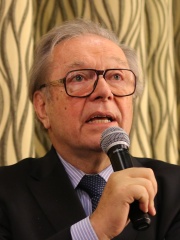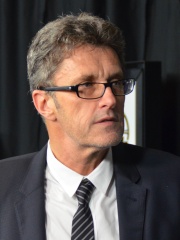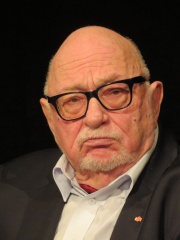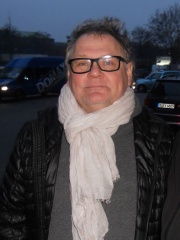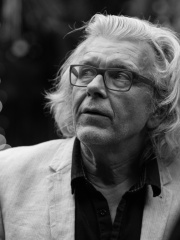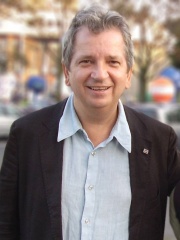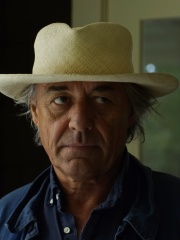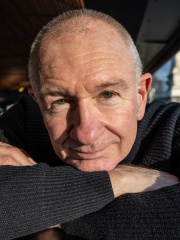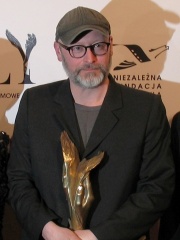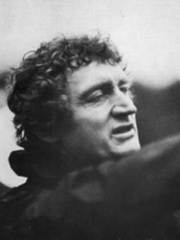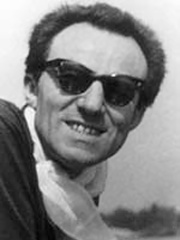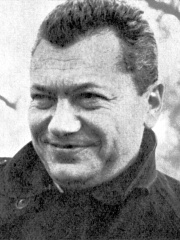
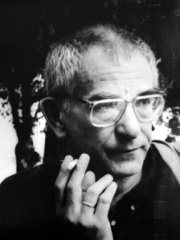
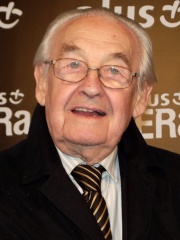
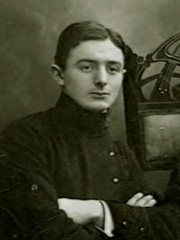
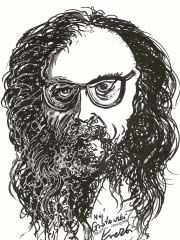
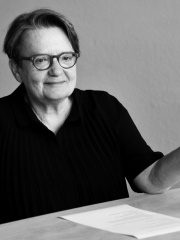
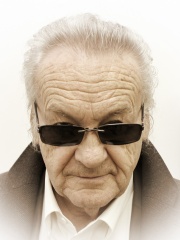
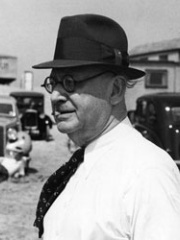
The Most Famous
FILM DIRECTORS from Poland
This page contains a list of the greatest Polish Film Directors. The pantheon dataset contains 2,041 Film Directors, 36 of which were born in Poland. This makes Poland the birth place of the 11th most number of Film Directors behind Spain, and Ukraine.
Top 10
The following people are considered by Pantheon to be the top 10 most legendary Polish Film Directors of all time. This list of famous Polish Film Directors is sorted by HPI (Historical Popularity Index), a metric that aggregates information on a biography's online popularity. Visit the rankings page to view the entire list of Polish Film Directors.

1. Billy Wilder (1906 - 2002)
With an HPI of 75.36, Billy Wilder is the most famous Polish Film Director. His biography has been translated into 68 different languages on wikipedia.
Billy Wilder ( WYLE-dər, German: [ˈvɪldɐ] ; born Samuel Wilder; June 22, 1906 – March 27, 2002) was an American filmmaker and screenwriter. Born in Sucha Beskidzka, at the time in Austria-Hungary (now Poland), Wilder's career in Hollywood spanned five decades, and he is regarded as one of the most brilliant and versatile filmmakers of classical Hollywood cinema. He received seven Academy Awards (among 21 nominations), a BAFTA Award, the Cannes Film Festival's Palme d'Or and two Golden Globe Awards. In 1916, when Wilder was ten years old, his family moved from Galicia to Vienna, where he worked as a journalist instead of attending university. Wilder's career as a screenwriter started in Berlin, where he relocated in his early adulthood. The rise of the Nazi Party and antisemitism in Germany saw him move to Paris. He then moved to Hollywood in 1934, and had a major hit when he, Charles Brackett and Walter Reisch wrote the screenplay for the Academy Award-nominated film Ninotchka (1939). Wilder established his directorial reputation and received his first nomination for the Academy Award for Best Director with Double Indemnity (1944), a film noir based on the novel by James M. Cain with a screenplay by Wilder and Raymond Chandler. Wilder won the Best Director and Best Screenplay Academy Awards for The Lost Weekend (1945), which also won the Academy Award for Best Picture. In the 1950s, Wilder directed and co-wrote a string of critically acclaimed films, including the Hollywood-set drama Sunset Boulevard (1950), for which he won his second screenplay Academy Award; Ace in the Hole (1951), Stalag 17 (1953) and Sabrina (1954). Wilder directed and co-wrote three films in 1957: The Spirit of St. Louis, Love in the Afternoon and Witness for the Prosecution. During this period, Wilder also directed Marilyn Monroe in two films, The Seven Year Itch (1955) and Some Like It Hot (1959). In 1960, Wilder co-wrote, directed and produced the critically acclaimed film The Apartment. It won Wilder Academy Awards for Best Picture, Best Director and Best Original Screenplay. Other notable films Wilder directed include One, Two, Three (1961), Irma la Douce (1963), Kiss Me, Stupid (1964), The Fortune Cookie (1966) and Avanti! (1972). Wilder received various honors over his career, including the AFI Life Achievement Award in 1986, the Kennedy Center Honors in 1990, the National Medal of Arts in 1993 and the BAFTA Fellowship Award in 1995. He also received the Directors Guild of America's Lifetime Achievement Award, the Laurel Award for Screenwriting Achievement and the Producers Guild of America's Lifetime Achievement Award. Seven of his films are preserved in the United States National Film Registry of the Library of Congress as being "culturally, historically or aesthetically significant".

2. Krzysztof Kieślowski (1941 - 1996)
With an HPI of 75.06, Krzysztof Kieślowski is the 2nd most famous Polish Film Director. His biography has been translated into 63 different languages.
Krzysztof Kieślowski (Polish: [ˈkʂɨʂtɔf kʲɛɕˈlɔfskʲi] , 27 June 1941 – 14 March 1996) was a Polish film director and screenwriter. He is known internationally for Dekalog (1989), The Double Life of Veronique (1991), and the Three Colours trilogy (1993–1994). Kieślowski received numerous awards during his career, including the Cannes Film Festival Jury Prize (1988), FIPRESCI Prize (1988, 1991), and Prize of the Ecumenical Jury (1991), the Venice Film Festival FIPRESCI Prize (1989), Golden Lion (1993), and OCIC Award (1993), and the Berlin International Film Festival Silver Bear (1994). In 1995, he received Academy Award nominations for Best Director and Best Original Screenplay. In 2002, Kieślowski was listed at number two on the British Film Institute's Sight & Sound list of the top ten film directors of modern times. In 2007, Total Film magazine ranked him at No. 47 on its "100 Greatest Film Directors Ever" list.

3. Andrzej Wajda (1926 - 2016)
With an HPI of 74.25, Andrzej Wajda is the 3rd most famous Polish Film Director. His biography has been translated into 69 different languages.
Andrzej Witold Wajda (Polish: [ˈandʐɛj ˈvajda]; 6 March 1926 – 9 October 2016) was a Polish film and theatre director. Recipient of an Honorary Oscar, the Palme d'Or, as well as Honorary Golden Lion and Honorary Golden Bear Awards, he was a prominent member of the "Polish Film School". He was known especially for his trilogy of war films consisting of A Generation (1955), Kanał (1957) and Ashes and Diamonds (1958). He is considered one of the world's most renowned filmmakers, whose works chronicled his native country's political and social evolution and dealt with the myths of Polish national identity offering insightful analyses of the universal element of the Polish experience – the struggle to maintain dignity under the most trying circumstances. Four of his films have been nominated for the Academy Award for Best Foreign Language Film: The Promised Land (1975), The Maids of Wilko (1979), Man of Iron (1981) and Katyń (2007).

4. Dziga Vertov (1896 - 1954)
With an HPI of 72.03, Dziga Vertov is the 4th most famous Polish Film Director. His biography has been translated into 53 different languages.
Denis Arkadyevich Vertov (born David Abelevich Kaufman; 2 January 1896 [O.S. 21 December 1895] – 12 February 1954), better known as Dziga Vertov, was a Soviet pioneer documentary film and newsreel director, as well as a cinema theorist. His filming practices and theories influenced the cinéma vérité style of documentary movie-making and the Dziga Vertov Group, a radical film-making cooperative which was active from 1968 to 1972. He was a member of the Kinoks collective, with Elizaveta Svilova and Mikhail Kaufman. In the 2012 Sight & Sound poll, critics voted Vertov's Man with a Movie Camera (1929) the eighth-greatest film ever made. Vertov's younger brothers Boris Kaufman and Mikhail Kaufman were also noted filmmakers, as was his wife, Yelizaveta Svilova. He worked with Boris Kaufman and cinematographer Mikhail Kaufman on his most famous film Man with a Movie Camera.
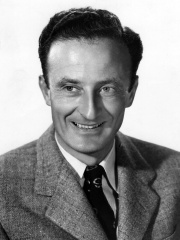
5. Fred Zinnemann (1907 - 1997)
With an HPI of 71.49, Fred Zinnemann is the 5th most famous Polish Film Director. His biography has been translated into 54 different languages.
Alfred Zinnemann (April 29, 1907 – March 14, 1997) was an Austrian and American film director, producer, and screenwriter. Born in Austria-Hungary and educated in France and Germany, Zinnemann began his career in Europe before emigrating to the US, where he specialized in shorts before making 25 feature films during his 50-year career. He won four Academy Awards, both for directing and producing, and made films in a variety of genres including thrillers, westerns, film noir, and stage adaptations. Among his best-known films were The Search (1948), The Men (1950), High Noon (1952), From Here to Eternity (1953), Oklahoma! (1955), The Nun's Story (1959), The Sundowners (1960), A Man for All Seasons (1966), The Day of the Jackal (1973), and Julia (1977). His films received 65 Oscar nominations, winning 24; Zinnemann himself was nominated for 10, and won Best Director for From Here to Eternity (1953), Best Picture and Best Director for A Man for All Seasons (1966), and Best Documentary, Short Subjects for Benjy (1951). He directed and introduced a number of stars in their American film debuts, including Marlon Brando, Rod Steiger, Pier Angeli, Julie Harris, Brandon deWilde, Montgomery Clift, Shirley Jones and Meryl Streep. He directed 19 actors to Oscar nominations, including Frank Sinatra, Montgomery Clift, Audrey Hepburn, Glynis Johns, Paul Scofield, Robert Shaw, Wendy Hiller, Jason Robards, Vanessa Redgrave, Jane Fonda, Gary Cooper and Maximilian Schell. Zinnemann was among the first directors to insist on using authentic locations and for mixing stars with non-professional actors to give his films more realism. Within the film industry, he was considered a maverick for taking risks and thereby creating unique films, with many of his stories being dramas about lone and principled individuals tested by tragic events. Among other honors, Zinnemann received a U.S. Congressional Gold Medal in 1987, a BAFTA Fellowship, and the French Ordre des Arts et des Lettres.

6. Jerzy Grotowski (1933 - 1999)
With an HPI of 69.33, Jerzy Grotowski is the 6th most famous Polish Film Director. His biography has been translated into 38 different languages.
Jerzy Marian Grotowski (Polish: [ˈjɛʐɨ ˈmarjan grɔˈtɔfskʲi]; 11 August 1933 – 14 January 1999) was a Polish theatre director and dramatic theorist whose innovative approaches to acting, training and theatrical production have significantly influenced theatre today. He is considered one of the most influential theatre practitioners of the 20th century as well as one of the founders of experimental theatre. He was born in Rzeszów, in southeastern Poland, in 1933 and studied acting and directing at the Ludwik Solski Academy of Dramatic Arts in Kraków and Russian Academy of Theatre Arts in Moscow. He debuted as a director in 1957 in Kraków with Eugène Ionesco's play Chairs (co-directed with Aleksandra Mianowska) and shortly afterward founded a small laboratory theatre in 1959 in the town of Opole in Poland. During the 1960s, the company began to tour internationally and his work attracted increasing interest. As his work gained wider acclaim and recognition, Grotowski was invited to work in the United States and left Poland in 1982. Although the company he founded in Poland closed a few years later in 1984, he continued to teach and direct productions in Europe and America. However, Grotowski became increasingly uncomfortable with the adoption and adaptation of his ideas and practices, particularly in the US. So, at what seemed to be the height of his public profile, he left America and moved to Italy where he established the Grotowski Workcenter in 1985 in Pontedera, near Pisa. At this centre, he continued his theatre experimentation and practice, and it was here that he continued to direct training and private theatrical events almost in secret for the last twenty years of his life. Suffering from leukemia and a heart condition, he died in 1999 at his home in Pontedera.

7. Agnieszka Holland (b. 1948)
With an HPI of 67.01, Agnieszka Holland is the 7th most famous Polish Film Director. Her biography has been translated into 41 different languages.
Agnieszka Holland (Polish: [aɡˈɲɛʂka ˈxɔlant]; born 28 November 1948) is a Polish film and television director and screenwriter, best known for her cultural and political contributions to Polish cinema. She began her career as an assistant to directors Krzysztof Zanussi and Andrzej Wajda, and emigrated to France shortly before the 1981 imposition of the martial law in Poland. Holland is best known for her films Europa Europa (1990), for which she received a Golden Globe Award as well as an Academy Award for Best Adapted Screenplay nomination, The Secret Garden (1993), Angry Harvest and the Holocaust drama In Darkness, the last two of which were nominated for the Academy Award for Best Foreign Language Film. In 2017, she received the Alfred Bauer Prize (Silver Bear) for her film Spoor at the Berlin International Film Festival. She is also a four-time winner of the Grand Prix at the Gdynia Film Festival. In 2020, she was elected President of the European Film Academy. In 2023, her film Green Border won the Special Jury Prize at the Venice International Film Festival. In her films, Holland often focuses on the individual experiences of people who find themselves on the sidelines of political events. A recurring theme she explores is the critique of Nazi and communist crimes.

8. Jerzy Skolimowski (b. 1938)
With an HPI of 66.63, Jerzy Skolimowski is the 8th most famous Polish Film Director. His biography has been translated into 36 different languages.
Jerzy Skolimowski (Polish: [ˈjɛʐɨ skɔliˈmɔfskʲi]; born 5 May 1938) is a Polish film director, screenwriter, dramatist, actor and painter. Beginning as a screenwriter for Andrzej Wajda's Innocent Sorcerers (1960), Skolimowski has made more than twenty films since his directorial debut The Menacing Eye (1960). In 1967 he was awarded the Golden Bear prize for his Belgian film The Departure (1967). Among his other notable films is Deep End (1970), starring Jane Asher and John Moulder Brown; The Shout (1978), starring Alan Bates, Susannah York and John Hurt; Moonlighting (1982), starring Jeremy Irons; and Essential Killing (2010), starring Vincent Gallo. He lived in Los Angeles for over 20 years where he painted in a figurative, expressionist mode and occasionally acted in films. He returned to Poland, and to filmmaking as a writer and director, after a 17-year hiatus with Four Nights with Anna (2008). He received the Golden Lion Award for Lifetime Achievement at the 2016 Venice Film Festival. His film EO (2022) was awarded the Jury Prize at the Cannes Film Festival and was nominated for the Academy Award for Best International Feature Film at the 95th Academy Awards.

9. Robert Wiene (1873 - 1938)
With an HPI of 66.13, Robert Wiene is the 9th most famous Polish Film Director. His biography has been translated into 34 different languages.
Robert Wiene (German: [ˈviːnə]; 27 April 1873 – 17 July 1938) was a German film director, screenwriter and producer, active during the silent era. He is widely-known for directing the landmark 1920 film The Cabinet of Dr. Caligari and a succession of other expressionist films. Wiene also directed a variety of other films of varying styles and genres. Following the Nazi rise to power in Germany, Wiene, who was of Jewish descent, fled into exile.
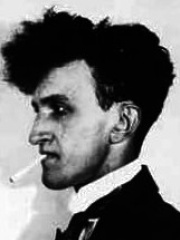
10. Jean Epstein (1897 - 1953)
With an HPI of 65.61, Jean Epstein is the 10th most famous Polish Film Director. His biography has been translated into 32 different languages.
Jean Epstein (French: [ʒɑ̃ ɛpʃtajn]; 25 March 1897 – 2 April 1953) was a French filmmaker, film theorist, literary critic, and novelist. Although he is remembered today primarily for his adaptation of Edgar Allan Poe's The Fall of the House of Usher, he directed three dozen films and was an influential critic of literature and film from the early 1920s through the late 1940s. He is often associated with French Impressionist Cinema and the concept of photogénie.
People
Pantheon has 36 people classified as Polish film directors born between 1873 and 1981. Of these 36, 16 (44.44%) of them are still alive today. The most famous living Polish film directors include Agnieszka Holland, Jerzy Skolimowski, and Krzysztof Zanussi. The most famous deceased Polish film directors include Billy Wilder, Krzysztof Kieślowski, and Andrzej Wajda. As of April 2024, 2 new Polish film directors have been added to Pantheon including Jan Komasa, and DK Welchman.
Living Polish Film Directors
Go to all RankingsAgnieszka Holland
1948 - Present
HPI: 67.01
Jerzy Skolimowski
1938 - Present
HPI: 66.63
Krzysztof Zanussi
1939 - Present
HPI: 64.47
Paweł Pawlikowski
1957 - Present
HPI: 63.00
Jerzy Hoffman
1932 - Present
HPI: 62.40
Janusz Kamiński
1959 - Present
HPI: 56.78
Zbigniew Rybczyński
1949 - Present
HPI: 56.09
Juliusz Machulski
1955 - Present
HPI: 55.36
Dariusz Wolski
1956 - Present
HPI: 54.38
Andrzej Sekuła
1954 - Present
HPI: 53.23
Paweł Edelman
1958 - Present
HPI: 53.09
Wojciech Smarzowski
1963 - Present
HPI: 47.51
Deceased Polish Film Directors
Go to all RankingsBilly Wilder
1906 - 2002
HPI: 75.36
Krzysztof Kieślowski
1941 - 1996
HPI: 75.06
Andrzej Wajda
1926 - 2016
HPI: 74.25
Dziga Vertov
1896 - 1954
HPI: 72.03
Fred Zinnemann
1907 - 1997
HPI: 71.49
Jerzy Grotowski
1933 - 1999
HPI: 69.33
Robert Wiene
1873 - 1938
HPI: 66.13
Jean Epstein
1897 - 1953
HPI: 65.61
Jerzy Stuhr
1947 - 2024
HPI: 65.55
Walerian Borowczyk
1923 - 2006
HPI: 63.64
Andrzej Munk
1921 - 1961
HPI: 59.21
Wojciech Has
1925 - 2000
HPI: 59.03
Newly Added Polish Film Directors (2025)
Go to all RankingsOverlapping Lives
Which Film Directors were alive at the same time? This visualization shows the lifespans of the 20 most globally memorable Film Directors since 1700.

